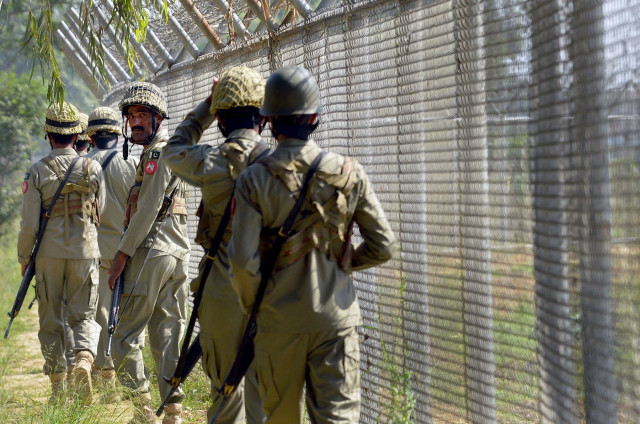Pak-India relations — is there a way forward?
The BJP being in power in India suits the military in Pakistan, enabling it to justify its policies

PHOTO: AFP
The hard truth is that the two countries are caught in a test of wills, promoting opposing visions of how relations can be normalised. For Pakistan, it is the resolution of the Kashmir dispute, whereas India accords high priority to terrorism and is unwilling to engage on other issues. All this is layered with emotions and ego, and is oblivious to the reality that the way India-Pakistan relations are managed at the present will determine the security dynamics and landscape of South Asia in the years to come.
It is important for leaders of both countries to appreciate that pursuing a policy of undermining each other has not paid off in the past and is unlikely to be rewarding in the future. Borders have shrunk and despite sophisticated measures to insulate neighbours, such a policy seemingly does not work. What is needed is respecting the security of other countries. Only then will it be possible to ensure the security of your own. Tragically, both India and Pakistan are supporting each other’s dissident forces. India, of late, has been harbouring Baloch separatists and supporting the TTP. There are also reliable reports that India is meddling in Karachi and other hot spots in Pakistan. Similarly, Pakistan is accused of looking the other way when operatives of the Lashkar-e-Taiba try to sneak across the border. Pakistan should give up its policy of supporting non-state actors, which only serves to weaken its international standing and credibility. The establishment probably thinks that there is little incentive to suppress Pakistani activities when India remains intransigent. One could argue that support for militant organisations has a dangerous and corrosive influence on society and is against international norms. As a consequence, a majority of countries feel more inclined to share India’s viewpoint.
What, then, will bring a shift in the policies of the two countries, or do their leaders believe that the existing approach best serves their national goals? If this is the case, then Pakistan should consider whether its current policy has brought the Kashmir dispute any closer to resolution? Similarly, has India’s policy facilitated resolution of conflicts? In fact, discontent in Kashmir is widespread and it is only through brutal suppression that India is maintaining a facade of peace. One is justified in asking what India has gained by not allowing the Pakistani delegation from meeting the Hurriyat leaders. Does it feel sufficiently confident that it can handle the chronic problem of Kashmir unilaterally, without Pakistan’s ‘meddling’? Is it not better that Pakistan engages openly with leaders who are known to be moderate and accommodating? It is more of false pride than anything else which has led the Indian leadership to feel that it can resolve the Kashmir problem unilaterally. There is an impression that India feels it has reached an international standing by virtue of its geo-strategic and political importance and that now it can dictate terms, like the US does, or it can replicate the Israeli model of dealing with the Palestinians when it comes to dealing with Kashmir.
India is aware that its aspirations for economic development could be affected if tensions with Pakistan rise to a level that leads to a serious conflict. It will try to pressure Islamabad by rejecting formal engagement and maligning Pakistan at international forums, but will refrain from crossing the threshold. Currently, it is not interested in trade with Pakistan, which is a minuscule two per cent of its global volume, although potential for increasing it does exist if normal market forces are allowed to operate freely. Islamabad’s reluctance to grant MFN status to India is an additional impediment to normalising trade.
The civil-military imbalance being skewed in favour of the latter gives another reason to India for ignoring Nawaz Sharif’s efforts at improving relations. The establishment insists that relations with India are contingent on its willingness to discuss the future of Kashmir. By pursuing a hard line towards Pakistan, India further strengthens the role of the military. It is not surprising that the BJP being in power in India suits the military in Pakistan, enabling it to justify its policies. This, in turn, boosts the power of the hardliners in India and gives them the driving seat. Both have their strong views and it is difficult to visualise if there would be any meeting of minds and values any time soon. The resulting dynamic only perpetuates antagonism between the two countries.
The only real way forward is to actively cultivate the idea among Indians that Pakistan is less of a problem and has the potential to be a partner in South Asia — but for that to happen, Pakistan must continue its efforts to put its house in order with greater zeal. Moreover, the establishments in both countries must finally understand that their job is to build peace, not to perpetuate endless conflict that leads nowhere except towards a downward spiral. The two countries need to put their irreconcilable differences on the shelf and get to work on what they can agree upon and wait to resolve them later at an opportune moment. Otherwise, Pakistan as the junior partner will be condemned to live in the past and the senior one will find it hard to realise its ambitious goals.
Published in The Express Tribune, September 30th, 2015.
Like Opinion & Editorial on Facebook, follow @ETOpEd on Twitter to receive all updates on all our daily pieces.















COMMENTS
Comments are moderated and generally will be posted if they are on-topic and not abusive.
For more information, please see our Comments FAQ